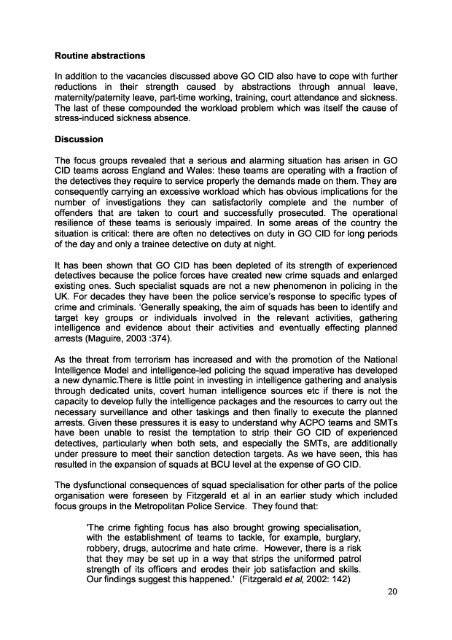LOSING THE DETECTIVES: VIEWS FROM THE ... - Police Federation
LOSING THE DETECTIVES: VIEWS FROM THE ... - Police Federation
LOSING THE DETECTIVES: VIEWS FROM THE ... - Police Federation
You also want an ePaper? Increase the reach of your titles
YUMPU automatically turns print PDFs into web optimized ePapers that Google loves.
Routine abstractions<br />
In addition to the vacancies discussed above GO CID also have to cope with further<br />
reductions in their strength caused by abstractions through annual leave,<br />
maternity/paternity leave, part-time working, training, court attendance and sickness.<br />
The last of these compounded the workload problem which was itself the cause of<br />
stress-induced sickness absence.<br />
Discussion<br />
The focus groups revealed that a serious and alarming situation has arisen in GO<br />
CID teams across England and Wales: these teams are operating with a fraction of<br />
the detectives they require to service properly the demands made on them. They are<br />
consequently carrying an excessive workload which has obvious implications for the<br />
number of investigations they can satisfactorily complete and the number of<br />
offenders that are taken to court and successfully prosecuted. The operational<br />
resilience of these teams is seriously impaired. In some areas of the country the<br />
situation is critical: there are often no detectives on duty in GO CID for long periods<br />
of the day and only a trainee detective on duty at night.<br />
It has been shown that GO CID has been depleted of its strength of experienced<br />
detectives because the police forces have created new crime squads and enlarged<br />
existing ones. Such specialist squads are not a new phenomenon in policing in the<br />
UK. For decades they have been the police service’s response to specific types of<br />
crime and criminals. ‘Generally speaking, the aim of squads has been to identify and<br />
target key groups or individuals involved in the relevant activities, gathering<br />
intelligence and evidence about their activities and eventually effecting planned<br />
arrests (Maguire, 2003 :374).<br />
As the threat from terrorism has increased and with the promotion of the National<br />
Intelligence Model and intelligence-led policing the squad imperative has developed<br />
a new dynamic.There is little point in investing in intelligence gathering and analysis<br />
through dedicated units, covert human intelligence sources etc if there is not the<br />
capacity to develop fully the intelligence packages and the resources to carry out the<br />
necessary surveillance and other taskings and then finally to execute the planned<br />
arrests. Given these pressures it is easy to understand why ACPO teams and SMTs<br />
have been unable to resist the temptation to strip their GO CID of experienced<br />
detectives, particularly when both sets, and especially the SMTs, are additionally<br />
under pressure to meet their sanction detection targets. As we have seen, this has<br />
resulted in the expansion of squads at BCU level at the expense of GO CID.<br />
The dysfunctional consequences of squad specialisation for other parts of the police<br />
organisation were foreseen by Fitzgerald et al in an earlier study which included<br />
focus groups in the Metropolitan <strong>Police</strong> Service. They found that:<br />
'The crime fighting focus has also brought growing specialisation,<br />
with the establishment of teams to tackle, for example, burglary,<br />
robbery, drugs, autocrime and hate crime. However, there is a risk<br />
that they may be set up in a way that strips the uniformed patrol<br />
strength of its officers and erodes their job satisfaction and skills.<br />
Our findings suggest this happened.' (Fitzgerald et al, 2002: 142)<br />
20
















